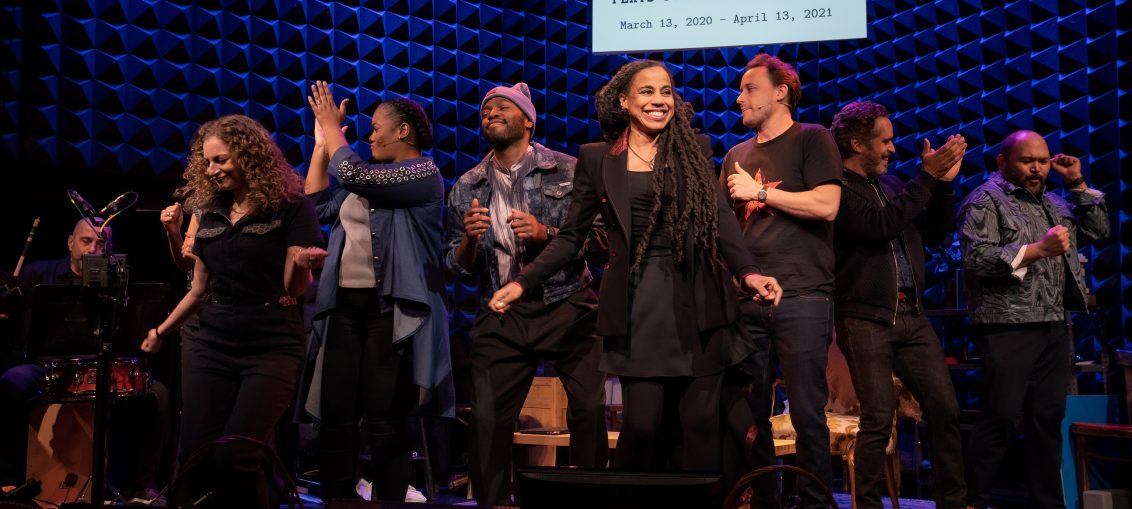
There is something powerfully cathartic about art created out of trauma, especially when that art reminds us that we aren’t alone in our pain. In Plays for the Plague Year, which opened last night at The Public Theater’s Joe’s Pub, Suzan-Lori Parks reminds her audience that pain shared is halved, but joy shared is doubled.
Parks created the piece from March 2020 to April 2021 while the country was in lockdown. Much as she did with 365 Days/365 Plays, Parks wrote one short play (and some songs) for each day, documenting the fear, anger and helplessness that dominated the national discourse during those 13 months. The theatrical diary covers everything from the pandemic to the Black Lives Matter movement to the election and its aftermath, vividly evoking a chaotic time through brief moments: A quick round of applause from the ensemble reminds us of how we used to clap at our windows at 7pm each evening; anxious passers by remind us of how scared we were of coming within six feet of another person;
Perhaps most effectively, Parks created “little plays” for people she knew or cared about who didn’t survive those 13 months. Some of them were famous. Some of them were loved by their families and neighbors. The tiny eulogies—elegies, really—emphasize their humanity and remind the audience of the human toll of that year. (Every now and then, a performer walks across the stage carrying a sign numbering the global dead from the pandemic, like a morbid ring girl in a boxing match that everyone is losing.) As the plays go on, they increasingly focus on the headline-making deaths from those days in increasingly heartbreaking ways: Ahmaud Arbery. Breonna Taylor. George Floyd. Ruth Bader Ginsburg. Rep. John Lewis. Little Richard. These deaths affected a nation, if not the world, and Parks’ tributes to them are powerful and genuinely moving.
But for all the tragedy, Parks’ script doesn’t wallow in pain. She finds humor in the struggle for normalcy and in the ways people adjust to rapid change. Her songs have a vibrant rock energy that keep the mood from becoming too mournful and remind us that life, ultimately, goes on.
Parks plays herself (and the guitar) in the show, backed by Ric Molina (also on guitar), Graham Kozak on bass and Ray Marchica on percussion. The band’s presence onstage make Joe’s Pub a particularly apt venue for a particularly nontraditional evening of theater: Not a musical in the most classic definition of the word, the show’s songs explore emotions rather than advance plot and nicely evoke the complex feelings of those frightening days.
Greg Keller and Leland Fowler play Parks’ husband and son, respectively, as well as multiple other people as the evening goes on. Their chemistry is strong and it’s easy to feel the affection the characters have for one another. Edward Astor Chin, Danyel Fulton, Orville Mendoza, Lauren Molina, Martín Solá, Rona Figueroa, Joe Osheroff, Danea Osseni and Nathan M. Ramsey round out the cast, playing a number of people from congressmen to Parks’ friends and colleagues and functioning beautifully both individually and as an ensemble.
Director Niegel Smith keeps the momentum going from scene to scene so that the evening’s three hours fly by quickly. Interestingly, many of the performers speak in quiet, indoor voices rather than projecting (despite the room being rather small), with Dan Moses Schreier’s sound design taking the soft sounds to the last row. It makes the show feel decidedly intimate and encourages the audience to focus closely on what Parks and the ensemble are saying, as does the use of the full venue rather than just the small stage. Peter Nigrini’s scenic and projection designs are minimalist and effective and work well with Ania Washington’s atmospheric lighting design.
Plays for the Plague Year is not always an easy watch, especially for those still dealing with loss and grief from the first year of the pandemic. But art can be therapeutic, and by blurring the lines between creators and performers and audience members, Parks invites us to form the kinds of connections that can help the healing start.
 Monday, July 14, 2025
Monday, July 14, 2025